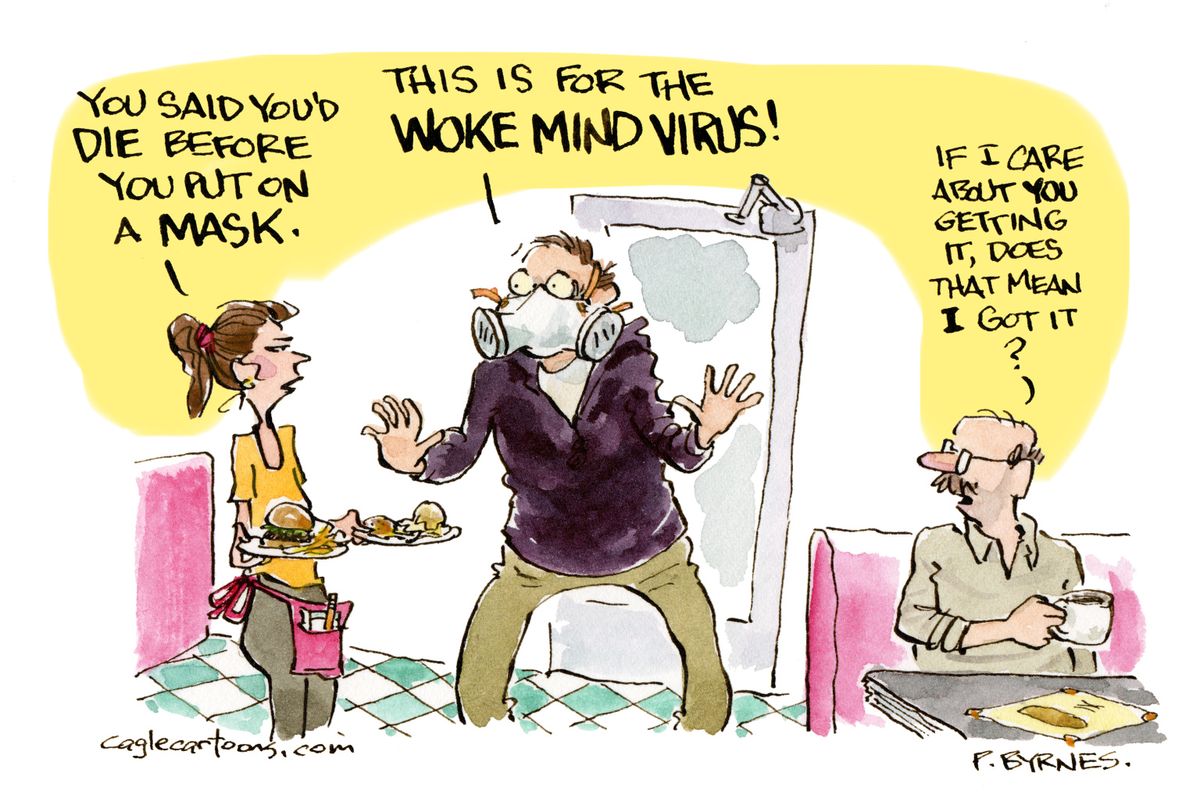Woke Mind Virus Meaning - What It Really Means
Have you ever stopped to think about a word that seems to be everywhere, yet its actual sense feels a bit slippery? It's almost as if one particular word has become completely unavoidable when people talk about public issues, particularly in the world of campaigns and political discussions. We hear it spoken often, but what does it truly stand for, and where did it even come from, you know? It's a word that stirs up a lot of chatter, and people sometimes use it in very different ways, which can be a little confusing, actually.
The term we're talking about, it has a history that goes back quite a way, particularly rooted in a serious cultural background. This history is really important for getting a handle on what it means when folks use it now. It's not just a new idea that popped up yesterday; it has layers of past usage that shape how it's received today. So, when you hear it, it's worth considering that there's more to it than just the immediate feeling it might give off.
You see, the way this word is described in official books that list words and their definitions, it talks about being very aware and paying close attention to important facts and happenings. This especially points to things like fairness for different groups of people and issues connected to how society works. It's often marked as something used in the United States, which is interesting, as a matter of fact, because it shows how much it has become a part of how we talk about things here.
- When Did Celine Dion Passed Away
- Smartstyle Woodstock Va
- Faafo Meaning
- T%C3%BCrk I%C5%9Ffa Sotwe
- Adrianna Chechik Twitter
Table of Contents
- What is the true story behind the term "woke"?
- How did "woke" come to be used in politics?
- Is "woke" always a negative thing?
- What does "woke" mean today for many people?
What is the true story behind the term "woke"?
Well, to get a real sense of this word, we have to look back at where it began. It's not a new invention, not really. The word actually has a very deep and important background within Black culture. For a very long time, it carried a particular sort of weight and significance there, a history that is, you know, quite serious and meaningful. It was used in a way that truly mattered to people within that community, signaling something very important for their safety and well-being, so.
The early days of woke mind virus meaning
In its first life, this term, the one that some people now call "woke mind virus meaning," was part of a specific way of speaking, a dialect that many people know as African American Vernacular English, sometimes shortened to AAVE. It was, in a way, a call to action, or perhaps more accurately, a gentle yet firm caution. The idea was to stay alert, to be on guard against unfair treatment, particularly when it came to racism. It was a way of telling people to keep their eyes open, to not be caught off guard by things that could hurt them or their community. It was about being present and aware of surroundings, especially those that might pose a risk, you know, for safety and fairness.
This initial sense of the word, it really centered on a deep awareness of racial discrimination and the many ways it could show itself. It was about recognizing subtle hints and bigger problems alike, all connected to how race affected people's lives. This was its main focus for a good while, actually. It was a word that held a lot of practical wisdom for people who faced these sorts of challenges regularly. It truly meant being awake to the realities of the world around them, particularly the difficult ones, very much so.
- Brian Glenn Wikipedia
- What Does Bocil Mean
- Jackson Appliance
- Drake Father
- Will Henry Ruggs Ever Play Again
How did "woke" come to be used in politics?
Then, something shifted. The word, which had been a kind of internal signal within one community, began to spread. It was picked up by people who were working to bring about social change, especially those who identified with more liberal viewpoints. This happened around 2020, a time when big movements for social justice were very much in the public eye. Think about the discussions around Black Lives Matter and the Me Too efforts; these were moments when a lot of people were talking about fairness and equality. It was during these times that the word started to be used more broadly, taking on a slightly different role, you know, in wider conversations.
Shifting perceptions of woke mind virus meaning
As it moved into these bigger public discussions, the idea of "woke mind virus meaning" began to take on new shades. It wasn't just about racism anymore, though that was still a big part of it. It grew to include an awareness of other kinds of unfairness in society. This meant thinking about things like gender equality, or how different groups might be treated differently based on who they are. So, the word became a kind of umbrella term for being aware of many different social issues and wanting to see things made more fair for everyone, actually. It was, in a way, a sign of being tuned into a broader range of social problems.
This expansion meant that the word started to show up in places it hadn't before. It eased its way into everyday talk, moving from a specific dialect into what we might call the general way people speak. This process of a word moving from a particular group's language into the common language is something that happens quite a lot. It shows how words can change and grow, picking up new associations as more and more people start to use them. So, the "woke mind virus meaning" started to become something that many people would recognize, even if they didn't know its full history, very much so.
Is "woke" always a negative thing?
Interestingly, while the word was spreading, something else was happening. The terms "wokeness" and "woke ideology" started to be used in a way that was, well, not so friendly. They became words that people would throw around to criticize certain actions or ideas. It's almost as if these terms became a kind of label for things that some people didn't like, even if those things were quite different from each other. So, you might hear someone say that something is "woke" as a way of saying they disagree with it, or that they see it as a problem, you know.
The broader scope of woke mind virus meaning
These uses, where "woke mind virus meaning" becomes a kind of insult, are applied to a whole bunch of different actions and beliefs. Even though these actions might be very varied in what they are trying to do, they often share a similar sort of quality in the eyes of the people using the critical terms. It's like they are all seen as part of a general outlook that the speaker finds fault with. This shows how a word can get twisted, or at least how its meaning can become something very different depending on who is saying it and why. It's a bit like how a tool can be used for many different jobs, some good, some not so good, basically.
So, a practice that someone might see as a positive step towards fairness, another person might label as "woke" in a way that suggests it's misguided or extreme. This makes the word quite charged, doesn't it? It means that when you hear it, you often have to think about who is saying it and what their intentions might be. It's no longer a simple descriptor; it carries a lot of emotional weight and often signals a particular viewpoint, which is something to keep in mind, really.
What does "woke" mean today for many people?
Today, the dictionary offers a way to understand "woke mind virus meaning" as being very much aware and giving active attention to significant facts and important issues. This definition specifically points to matters of racial justice and social fairness. So, if you look it up, that's what you'll find it described as. It's identified as a term used in the United States, which suggests its strong connection to current American discussions about society and culture, you know, very much so.
The evolving public face of woke mind virus meaning
This shows that despite all the different ways the word gets used, and even abused, its core meaning still ties back to an awareness of important societal challenges. It's about being awake to things that might not be fair, or things that need to be addressed to make society better for everyone. Whether someone uses it to praise an action or to criticize it, the underlying idea of being attentive to social issues is still there. It's just that the feeling around the word has become very complex, and its use can really depend on the speaker's outlook, as a matter of fact. It's a word that has certainly had quite a journey from its beginnings to where it is now in public conversation.
So, the word has gone from being a quiet warning within a community to a loud and often debated term in public life. It started as a way to encourage vigilance against unfairness, particularly racism. Then, it expanded to include a wider sense of awareness about social inequality. Now, you hear it everywhere, sometimes as a description of someone who is socially conscious, and other times as a critical label for ideas that some people don't agree with. It's a word that truly reflects the many layers of how we talk about fairness and justice in our world today, and how language itself can shift and change meaning over time, basically.
- Cast Of The Original Wizard Of Oz
- What Is Gojos Last Name
- River Bend Pizza Photos
- Turkish Ifsa Sotwe
- How Tall Is Rene%C3%A9 Rapp

Opinion | The ‘Woke Mind Virus’ Is Eating Away at Republicans’ Brains

Woke mind virus | The Week

Woke mind virus pushing civilisation towards suicide: Elon Musk